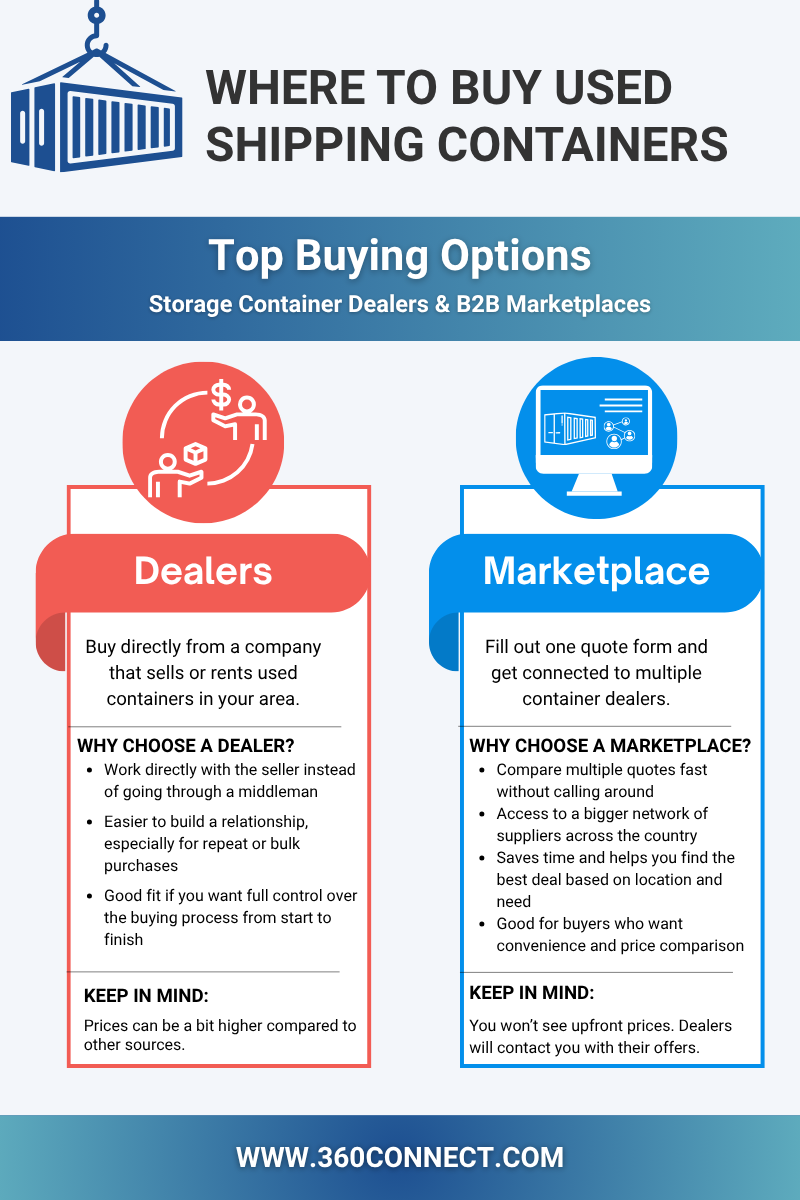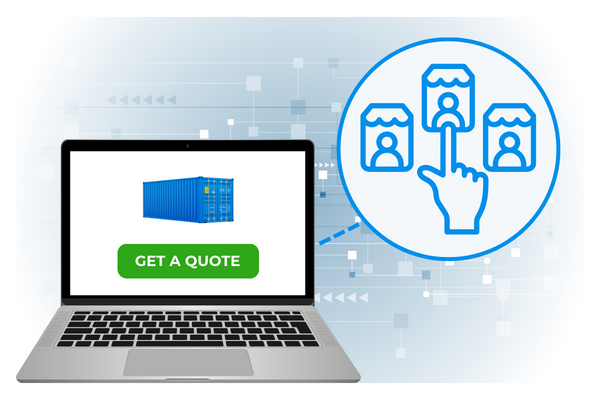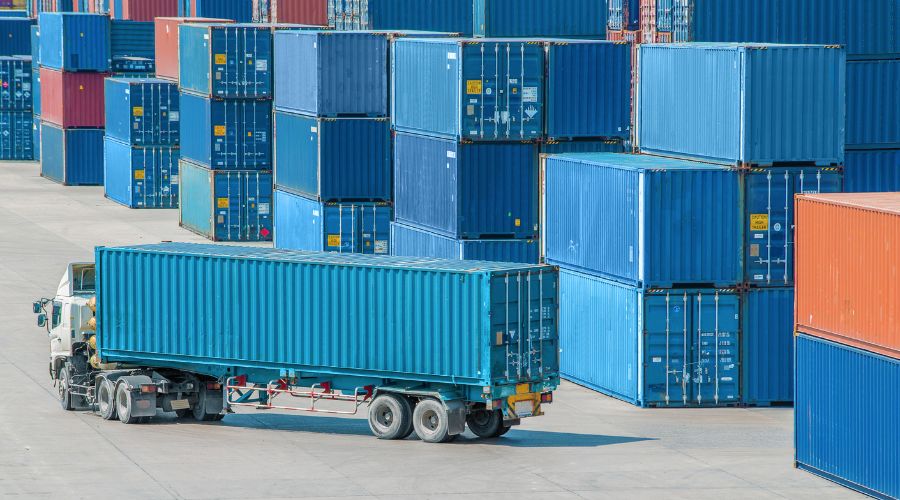Looking to buy a used shipping container? Whether it’s for your business or your home, used shipping containers offer tough, flexible storage and workspace solutions. But…where do you buy used shipping containers?
Finding where to buy or rent the right used shipping container for your needs and budget can be challenging. This guide will walk you through the top places to buy or rent used shipping containers, what to expect from each, and tips to help you make a confident decision.
Key Takeaways
-
You can buy used shipping containers from dealers, online marketplaces, or resellers. Each has pros and cons depending on your budget, timeline, and comfort level.
-
Online marketplaces let you compare multiple quotes fast, while dealers offer more hands-on service and inventory you can inspect in person.
-
If you need the container short-term, rent it. But if you’re using it long-term, buying a used container will save you more in the long run.
Where Can I Buy Used Shipping Containers?
When it comes to determining where to buy used shipping containers (also known as storage containers), you have two main avenues: online or in person. Each approach has its advantages. Choosing the right one depends on your preference for convenience versus in-person interactions, as well as factors like availability in your area and comfort with the buying process.
Let’s look at what each option has to offer when deciding where to buy used shipping containers.
Online Used Shipping Containers
Buying a used shipping container online offers unparalleled convenience and a broad selection. With a few clicks, you can browse listings from sellers nationwide and compare prices without leaving your home or office. Online platforms, including e-commerce websites, classifieds, and specialized container marketplaces, make it easy to filter by storage container size, condition, and price. This means you can shop around for the best deal and even negotiate with sellers digitally. One big advantage of buying online is the ability to research and find a bargain. With so many listings available, thorough searching can uncover a great price on a used shipping container. Plus, you save time by doing all the legwork virtually.
However, online buying also comes with some precautions. You can’t inspect the container in person before purchase, so you have to rely on photos and the seller’s description. Reputable online sellers will provide detailed pictures and information, but it’s wise to be cautious. Watch out for deals that seem “too good to be true” on third-party classifieds or auction sites. There’s also a risk of scams or misrepresented conditions if the seller is not verified. If possible, ask for additional photos or even a video tour of the container’s current state. Also, clarify the delivery arrangements upfront. Not all online sellers include transportation in the price, and shipping a container to your location can add significant cost.

In short, buying or renting a used shipping container online is a convenient and efficient route as long as you research sellers carefully and verify details before committing.
In-Person Used Shipping Containers
Buying or renting a used storage container in person is a more hands-on approach. This typically means visiting a local storage container dealer’s lot, a port or depot where containers are sold, or even a live auction. The key benefit here is that you get to inspect the container directly before buying. You can walk inside, check for rust or dents, ensure the doors seal properly, and judge the overall structural integrity on the spot. For used containers, this peace of mind is valuable. You know exactly what you’re getting in terms of condition. In-person buying also opens up the opportunity to negotiate the price. Local dealers or sellers might be willing to haggle, especially if you’re buying on the spot or purchasing multiple units.
Common in-person sources include dedicated container dealerships, shipping yards or depots that sell used containers, and occasionally government or commercial auctions. For example, some shipping ports or rail yards periodically sell decommissioned containers at a discount to clear out inventory. You might find a great deal this way, but keep in mind auctions are typically as-is sales, so you’ll be responsible for any repairs or transport. Another consideration is that shopping in person can be time-consuming and geographically limited. You’ll have access only to the inventory that a particular location has at that moment, which might mean a more limited selection than what’s available online.

Additionally, you’ll need to arrange for transporting the container from the seller’s location to your site (if you don’t have your own truck, the dealer can usually deliver for an extra fee). For those who prefer a face-to-face transaction and a first-hand look at the container, the in-person route is worth it despite requiring a bit more effort.
Where to Buy Used Shipping Containers
Both online and in-person methods can work well, but who exactly should you buy used shipping containers from? In the used shipping container market, two sources stand out as the most common and reliable: dealers and online marketplaces. Each of these options offers unique benefits and considerations. Below, we’ll dive into what you can expect from each source to help you decide where to buy used shipping containers.

Storage Container Dealers
Storage container dealers (also known as Storage Container Suppliers) are companies (or sometimes individuals) that specialize in selling and renting containers. They often have yards or inventories full of containers in various sizes and conditions. If you’re looking for a used shipping container, dealers are a great starting point simply because there’s no shortage of them. Many dealers operate regionally or nationally, and some focus on specific industries or container types. Whether you need a basic 20-foot storage container or a modified 40-foot container, chances are a dealer can supply it. Dealers typically offer a range of options, from “as-is” used containers to refurbished units that have been cleaned, repaired, or even repainted. They may also provide add-on services like delivery, installation on your site, or modifications (adding doors, windows, insulation, etc.), making the process convenient for buyers.
Local vs. National Used Shipping Container Dealers
One consideration is choosing between local vs. national dealers. Local dealers might have quicker delivery times and the ability to let you inspect containers in person. They also tend to understand local regulations (for example, if you need a permit to place a container on your property) and can offer personalized service. On the other hand, national dealers often have larger inventories and more variety. If you need an uncommon container size or want multiple units, a big supplier might serve you better. National companies usually have well-established delivery networks, so even if you’re in a remote area, they can get a container to you (though delivery fees will reflect the distance).
Advantages of Purchasing from a Storage Container Dealer
Storage container dealers are an excellent choice for buyers who want guidance and reliable quality throughout the buying process.
Here are some key advantages of buying from a used shipping container dealer:

Expert Guidance
Dealers have specialized knowledge and can help you choose the right size and type of container for your needs. They’ll listen to your requirements, whether you need a basic storage unit or a refrigerated container, and recommend suitable options based on their experience. This expertise is especially helpful if you’re not exactly sure what specifications you should look for.
Quality Assurance
Reputable dealers inspect their used containers and often perform basic refurbishments before sale. This means you’re more likely to get a container in good condition that’s weather-resistant and structurally sound. Many dealers grade their inventory (e.g., “cargo worthy” or “wind & water tight”), so you know what you’re paying for. You can rest assured that a container from a trusted dealer will be durable and ready to use, whereas buying from an unknown private seller could be riskier.
Wide Selection
Most dealers maintain a broad inventory. Different sizes (10 ft, 20 ft, 40 ft, etc.), various conditions (from like-new one-trip containers to well-used bargain units), and even custom-modified containers. This wide selection increases the chance that you’ll find exactly what fits your budget and needs. You can compare options side by side, such as paying a bit more for a newer unit versus saving money on one with a few cosmetic dings.
Additional Services
Unlike private sellers, dealers often provide end-to-end service. They can arrange delivery to your location and set the container in place for you. Some offer installation of lock boxes or shelving, painting services, or even long-term maintenance plans for leased containers. Essentially, a dealer can be a one-stop shop to buy the container and get it delivered hassle-free.
These advantages make dealers a popular choice for both first-time buyers and businesses alike. You might pay a bit of a premium for the dealer’s services and peace of mind, but many find it worthwhile for the convenience and support.
Pro Tips for Buying or Renting from Dealers
Keep these tips in mind to get the best value when working with a storage container dealer.
Inspect Before Buying
If possible, visit the dealer’s yard and inspect the actual container you intend to buy (especially for used units). Seeing it in person lets you check the floors, doors, and overall condition. If an in-person visit isn’t practical, request detailed pictures or a video, and make sure there’s a reasonable return or exchange policy in the contract in case the delivered container isn’t as advertised.
Understand the Full Cost
Ask the dealer for a breakdown of all costs involved. This includes the container price plus delivery fees (which can be significant if you’re far from the dealer), any customization charges, taxes, and so on. Don’t forget to account for accessories like lockboxes or ramps if you need them. Getting an all-in quote upfront will prevent surprise charges later.
Related: How Much Does a Shipping Container Cost?
Compare Dealers
Pricing and service can vary widely between dealers. It’s wise to get quotes from multiple sources before making your decision. Not only can this save you money, but you’ll also get a sense of who is more responsive and professional. When comparing, consider the total value. One dealer might be slightly more expensive but include delivery or a better condition unit, for example. Use those quotes as leverage politely. Some dealers might price-match if you have a lower quote from a competitor.
Related: Portable Storage Container Manufacturers & Dealers
B2B Online Marketplace
In today’s digital world, B2B online marketplaces have become a go-to starting point for buyers wondering “where to buy used storage containers”, especially if you’re not sure where to begin. They work by collecting your request (what size you need, your location, etc.) and matching you with multiple container suppliers who reach out with quotes.
Think of it like this: instead of calling 5–10 dealers yourself, you fill out one quote form, and the marketplace does the legwork. It’s a faster way to compare options, find availability, and hear directly from suppliers that serve your area. All without the pressure of committing to a single seller right away.
Most marketplaces are free to use and are designed specifically for B2B buyers. Whether you’re sourcing a container for commercial storage, construction use, or resale, a marketplace can help you get the ball rolling with less hassle. (Note: residential options are also usually available)
Advantages of Purchasing from Online Marketplaces
Buying from an online marketplace can be a great choice for many buyers due to these advantages:

Multiple Quotes, One Request
The biggest benefit is the ability to get several quotes without spending hours researching or calling sellers. Most marketplaces have a built-in vetting process, so you’re connected with trusted dealers who are ready to earn your business.
Access to Local and Regional Dealers
Marketplaces tap into a large network of suppliers across the country, including local yards you might not find on your own. That means better chances of finding what you need, whether it’s a specific size, condition, or delivery timeline.
Time-Saving and Convenient
There’s no need to browse endless listings or worry about outdated posts. You submit your request once, and qualified sellers take it from there. You’ll typically hear back via phone or email with pricing, availability, and delivery options.
What to Know Before Using a B2B Online Marketplace
Before working with a marketplace, keep these things in mind:
You Won’t See Listings or Pricing Upfront
Marketplaces don’t display inventory. Instead, they act as matchmakers. Once you submit your request, you’re connected directly with suppliers who have what you’re looking for. This can feel different if you’re used to online shopping, but it allows for real-time quotes based on current inventory.
Expect Follow-Up from Dealers
Be ready to hear from multiple sellers (usually within a day or two). They may call, email, or text you with pricing and options. You can compare, ask questions, and choose the one that best fits your needs.
Delivery and Extras Vary by Supplier
Each dealer handles their own pricing, warranties, delivery fees, and payment terms. Make sure to ask what’s included in the quote so you can compare apples to apples.
Pro Tips for Buying or Renting from an Online Marketplace
Maximize your success on a B2B container marketplace with these tips:
Be Clear About What You Need
When filling out the quote form, provide details like your preferred container size, condition (e.g., used, wind and water tight), delivery location, and any timeline you’re working with. The more specific you are, the better your matches will be.
Compare More Than Just Price
Don’t just go with the cheapest offer. Ask about container condition, age, previous use, and what’s included in the delivery. A slightly higher quote might come from a more responsive, reliable supplier with better logistics.
Ask Questions Before You Commit
Once you’re connected, don’t be afraid to get clarification. Ask for photos, warranty terms, delivery timelines, and anything else you want to know before saying yes.
Honorable Mention: Auctions & Third-Party Resellers
You can buy used containers at auctions or through third-party resellers, but should you?
These options pop up here and there, usually promising low prices. Think shipping line auctions, government surplus sites, or a guy on Craigslist who’s trying to offload a few retired containers. And sure, you might find a deal.
But here’s the catch: this route comes with more risk than reward for most buyers.
Why We Don’t Recommend This Route
You’re buying as-is, no guarantees
Auctions don’t offer inspection reports. Third-party resellers probably won’t let you peek inside. And once the sale is done, that container is yours. Dents, rust, holes, or past chemical spills included. If it leaks or the doors don’t shut, you’re stuck with it.
No support, no delivery help
Unlike working with a dealer, you’re not getting customer service. There’s no warranty, no repair offer, and no one’s coming to deliver the thing unless you handle that yourself. You’ll need to figure out how to haul it, unload it, and troubleshoot any issues after the fact.
Hit-or-miss availability
Container auctions happen sporadically. You might wait weeks (or months) for one in your area, only to find out they don’t have the size or condition you’re looking for. The same goes for one-off sellers. Listings come and go, and there’s zero consistency. That’s a problem if you’re on a timeline.
When (and How) to Proceed Carefully
If you’re still curious and want to explore these options, just go in with your eyes wide open. Bring someone who knows containers if you can. Ask for photos and details upfront. And make sure you’ve figured out transportation before you bid or buy. Most importantly? Set a hard budget so you don’t end up overpaying for a rusted-out headache.
For most people, it’s just not worth the gamble. Dealers or trusted marketplaces offer way more peace of mind, with real quotes, clear condition descriptions, and support if anything goes sideways. If you’re looking for reliability and don’t have time to play container roulette, stick with the pros.
Buying vs Renting Used Storage Containers
One of the first decisions you’ll need to make is whether to buy or rent your used shipping container. Both options are widely available for used units, but the right choice really depends on how long you’ll need it, how you plan to use it, and what kind of flexibility you want.
Let’s break it down.
When Renting Makes Sense
If you only need a container for a short-term project, renting is usually the smarter move. Maybe you’ve got a 3-month construction job or need some extra space during peak season. A temporary rental can save you a lot of upfront costs. Most dealers offer flexible rental programs where you pay by the month, and many will pick the unit up when you’re done.
On top of the low commitment, maintenance is usually included, so if there’s a problem with the unit, the company may repair or swap it out.
In short: Renting keeps things simple. You use it, then return it. No need to worry about reselling or storing it later.
When Buying Is the Better Deal
If you expect to use the container longer than 6–12 months, buying almost always works out cheaper. Rental fees can stack up quickly, and at a certain point, you’ll have paid just as much as the cost of buying without owning anything in return.
Buying gives you a one-time investment and a long-term asset. You can modify it however you want (paint it, add a door, build out shelving), and you can always sell it later to recover part of the cost. Used containers tend to hold their value well, especially if they’re kept in good condition.
A good rule of thumb: If your rental costs over time will exceed the price of buying, it’s time to own.
What About Rent-to-Own?
Some suppliers offer rent-to-own storage container programs that let you pay monthly, with each payment going toward the purchase price. It’s a solid option if you want to spread out the cost but plan to keep the container long-term.
Just know that you’ll likely pay a bit more overall. Rent-to-own plans often include fees or a small interest factor. And if you change your mind and return the container early, some contracts may treat it like a standard rental.
If you go this route, be sure to read the fine print:
- What’s the total cost by the end of the term?
- Are there penalties for early return?
- Is there a final balloon payment or transfer fee?
In Summary: Renting vs Buying Used Storage Containers
If your container needs are short and simple, renting is the easier way to go. Low commitment, no headaches. But if you’re thinking long-term or want more control over the unit, buying is usually the better investment. And if you’re somewhere in between, rent-to-own could offer a flexible path to ownership.
Before you decide, do the math: Compare rental rates to the current sale price, and factor in how long you’ll realistically need the container. The good news? If you end up buying and don’t need it later, you can often resell it. Used containers stay in demand and tend to hold value well.
Final Thoughts: Where to Buy Used Shipping Containers
At the end of the day, the best place to buy a used shipping container comes down to your needs.
If you want hands-on service and peace of mind, a reputable dealer is a great place to start. And if you’re looking for convenience, online marketplaces make it easy to compare your options in one place, fast.
Just don’t forget the basics: check container condition, factor in delivery, and make sure it fits your timeline and budget. You’ve got options, now it’s about finding the right match.
Get Used Shipping Container Quotes Today
360Connect helps you get up to 5 FREE Quotes from trusted suppliers near you, all with one quick form.
- Compare Quotes
- Save time
- Get matched to reliable, pre-vetted sellers
Ready to find the right container for your project?

